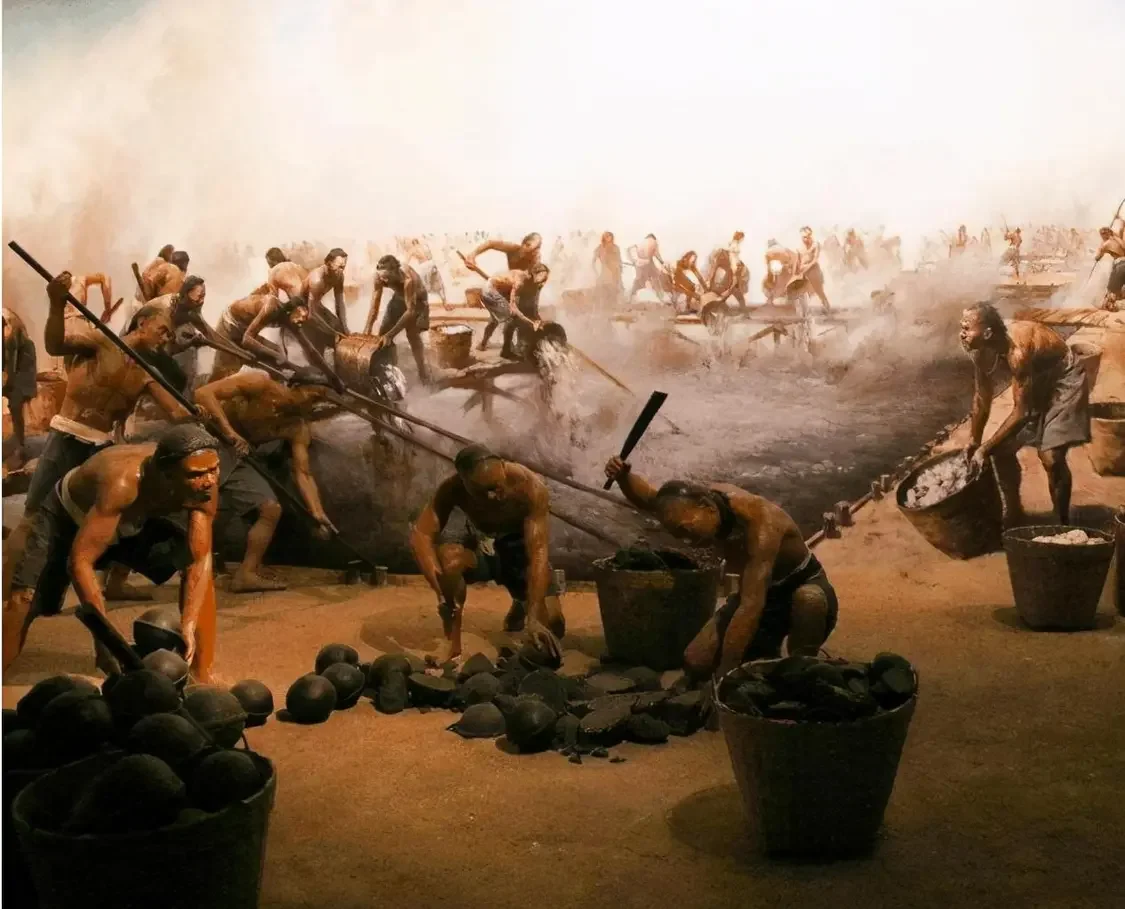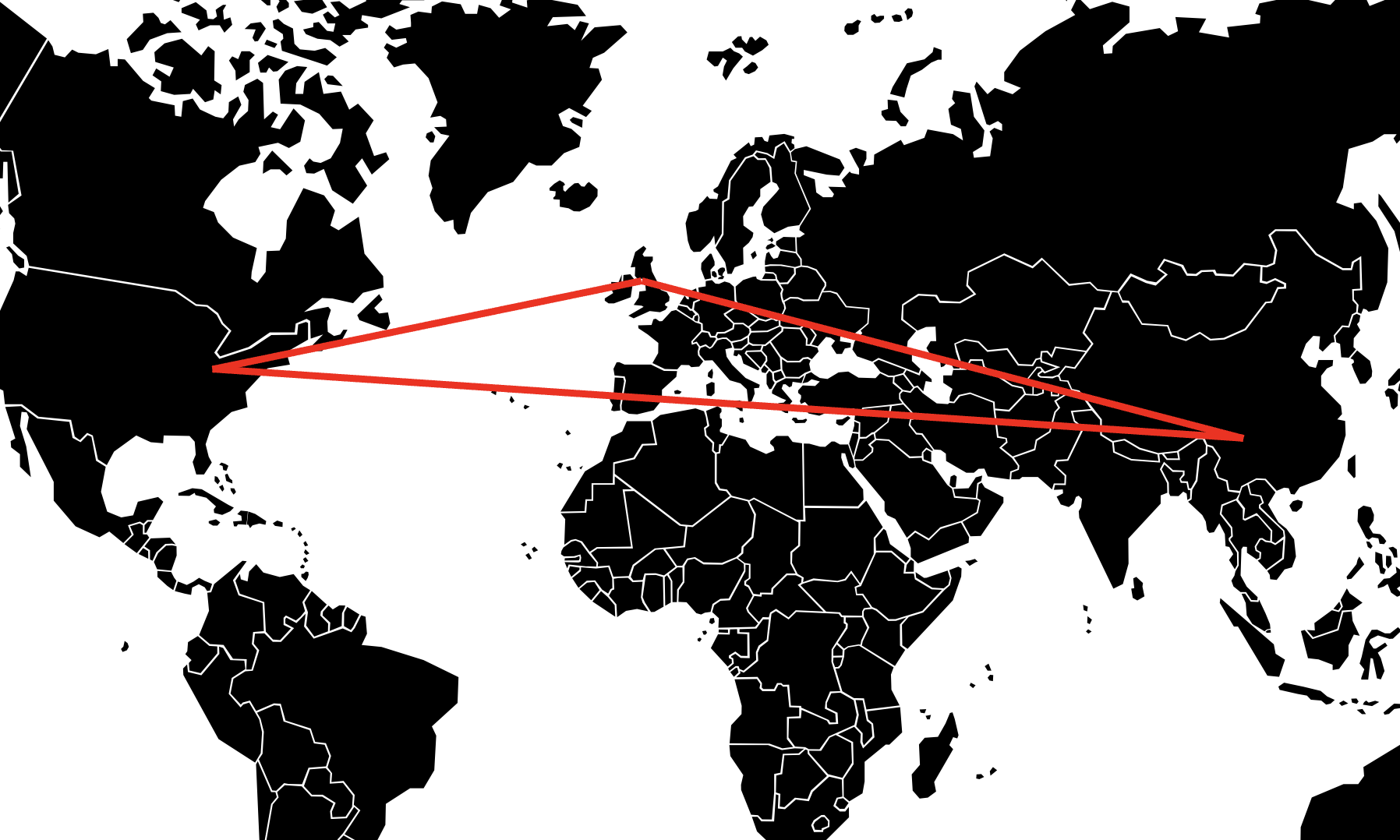
the beginning of the Century of Humiliation
The trading route discovered by Bartolomeu Dias from Europe to Asia by going around the Cape of Good Hope allowed business to proliferate between Asia and Europe. Immediately following, European countries started to trade intercontinentally and the period known as The Age of Exploration commenced, leading more or less to global colonization. In response to these developments, Great Britain launched the British East India Company to compete in global trade. The company extended its sphere of influence rapidly throughout the 17th century, eventually monopolizing trade in Asia in the 18th century and 19th century. At first, the company prioritized a financial relationship with India, based around commodities such as spice and cotton, until finally colonizing the country by defeating the Mughal empire and installing a British puppet state. Soon after these events, British business reached East Asia where they began trading with China.
Tea from China was one the most popular commodities in Europe during the 18th and 19th century. From the early 17th century, tea constituted an ultra-rare commodity for Europeans; it was reserved for feudal elites, with a miniscule annual import of only around twenty-thousand pounds. This rate grew to around 6.8 million pounds a few decades later in the 18th century, and continued to escalate to an astronomical twenty-one million pounds per annum by the end of 18th century and going to the early 19th century. By this era, tea was no longer a restricted item of the aristocracy, in fact, it became the most popular drink regardless of social class in British society. In light of Britain’s voracious importing of other Chinese goods such as porcelain and silk, the fiscal relationship between the two countries soon resulted in an enormous trade deficit, with Great Britain purchasing vastly more from China than it sold to them. So significant was this gap, that it precipitated Great Britain on the verge of economic crisis. With drained British silver coffers, the government sought to offset the deficit’s impact by exchanging cotton for tea. However, as Qing’s cotton production rose, the demand for British cotton sank and the trade deficit once more became a problem. In the last few decades, the Qing dynasty’s growing practice of social isolation had made the country incredibly self-sufficient. In order to address this, the Britain East India company established its East Asia version of “Triangular Trade”: selling industrial products manufactured in mainland Britain to their American colonies, Great Britain received gold and silver with which the company could fund their ballooning purchases of Chinese tea. This system worked well until the 7-year war between Britain and France which nearly doubled the national debt of Britain from approximately 75 million pounds to 133 million pounds. The British-Franco war raged across several continents, costing both nations significant manpower and money. Though Britain won the war and acquired large numbers of new colonies in North America and Asia, the economic cost foisted more economic pressure on the island state, forcing it to implement heavy tax on its colonies to counteract the impact of its military expenditure during the war. The Tea Act passed in 1773 which taxed American merchants’ tea was one such measure. However, the act eventually backfired on the British, triggering massive protests including the famously known Boston Tea Party, ultimately leading to the war of independence.
ademonstration of “triangular trade”
After the “Triangular Trade” ceased with independence of the United States in 1776, Britain had to find another way to balance the trade deficit with the Qing, which was a rather difficult task because China’s centuries of isolationist practice and feudal society had bolstered an extremely self-sufficient cultural and economic power. Instead of trying to find what the Chinese needed, Britain decided to manufacture the demand by selling Indian opium to China. Initially used as a type of anesthetic, opium is a highly addictive substance that the British panned as a lucrative alternative to tobacco. British merchants first proposed opium as a form of medicine with efficacy on health benefits, attracting a massive number of Chinese to try opium products. The propaganda was effective. Smoking opium was soon viewed as a timely fashion and status symbol. Smokehouses became a popular social space as a consequence and smoking opium even gained as a cultural act. All these factors made the government’s regulation of opium very challenging. The enormous opium importation inflicted an annual six-hundred million tael loss (one tael is equivalent to fifty grams of silver). Given the silver standard used by the Qing government, this outflow of silver inflamed inflation. The exact toll of such a predicament wasn’t properly recognized however, until 1830.
On Great Britain’s side, reversing or at least balancing the trade relationship with China was crucial because of the economic pressure they faced; the Empire’s global expansion was thinning crucial British resources. Qing’s extremely self-sufficient social structure made this equilibrium difficult to reach because the Qing society as a whole was indifferent to trade with European merchants—largely due to lack of domestic demand for British goods. Whereas on the Qing’s side, the dynasty was careless when it came to maintaining a balanced business relationship with Britain because the nation just opened its ports to foreign countries again in the early 18th century until they found opium was devastating the Chinese society by having a large proportion of people from all social classes started being addicted to opium. Eventually finding the impact of opium was intolerable for the country, the Qing government finally decided to ban opium in China and end the trade with foreign countries by employing isolationism again. In 1839, the head of the government officials who proclaimed to ban opium-Lin Ze Xu, was sent to Guangzhou to execute the command. Lin forced the British merchants to give away all their opium for Qing to destroy them as well as shutting trading ports such as Kantong to cease the trade with Britain. This incident was later known as the Destruction of Opium at Hu Men, which was also the fuse that led to the breakout of the first opium war. After destroying all the opium, Lin Ze Xu also wanted to punish the British merchants for their business. However, Charles Elliot, the British commercial director in China, refused to turn those British merchants in and argued the arrest’s legitimacy with British law. The conflict between Elliot and Lin Ze Xu kept on escalating until Lin Ze Xu finally decided to deport all British merchants and Elliot from Qing.
Upon going back to Britain, Elliot decided that Britain should open the trade with China with military force by convincing Queen Victoria to send troops to China because of how lucrative opium trade was with China. In June of 1840, Elliot arrived in the Chinese East sea with the British naval fleet, which marked the start of the first opium war. Due to the huge technological gap between the two countries and Qing’s lack of sufficient naval power on its coastal regions, the British fleet faced almost no resistance as they went up north all the way to Tianjin where the capital of Qing, Beijing, was on the verge of the attack range of the British artillery, forcing the Qing government to dismiss Lin Ze Xu and sending Qi Shan to negotiate with Britain. The first negotiation wasn’t successful and both sides were discontent upon the agreement that was reached, where the Qing government thought the agreement that was reached was an absolute humiliation on the country, while Queen Victoria thought the deals in the treaty were not maximized. The second round of war then burst and Qing armies were crushed by British troops due to the huge difference in both weapons and military literacy. The battle loss ratio was as high as 400:1, forcing emperor Dao Guang to call out the war and go back to negotiation. In 1842, the war ended with emperor Dao Guang signing the Treaty of Nanking, the first unequal treaty signed by China in modern Chinese history, and it also marks the beginning of the century of humiliation.
